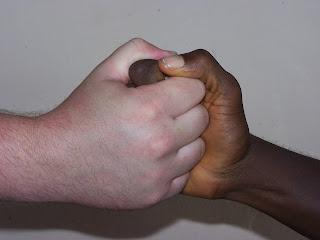Love Your Enemies?
He prayed to the LORD and said, “Oh, LORD, this is just what I thought would happen when I was in my own country. This is what I tried to prevent by attempting to escape to Tarshish! – because I knew that you are gracious and compassionate, slow to anger and abounding in mercy, and one who relents concerning threatened judgement. Jonah 4:2
The Ninevites were Jonah’s enemies. Nineveh was the capital of Assyria, which had harassed and terrorized Israel for a long time. In many ways, it could be likened to our modern enemy of al-Qaeda. Al-Qaeda and other groups have kept the world on its toes, always waiting for the next bomb to drop, both literally and figuratively.
On September 11th,
2001, they perpetrated multiple acts of terrorism on the US using planes to
crash into both of the Twin Towers in New York City as well as the Pentagon in Arlington,
Virginia. A fourth plane crashed in a field in Pennsylvania after passengers on
the airplane banded together to stop the terrorists, preventing the plane from
reaching its intended target. These attacks killed 2,977 people initially,
though many more have experienced long term effects, both physically and psychologically.
On September 16th of the same year, President George W. Bush
announced the “War on Terror.” This was not a war against a particular nation,
but against terrorism as a whole, with its ringleaders as particular targets.
As often happens in
war, hatred grew amongst Americans towards the people we were fighting. It
makes it easier to kill, or wish someone dead, when you hate them. Our country
saw a rise in racial profiling of anyone who looked like they were of
Middle-Eastern descent. Hate crimes abounded, both large and small. Once more,
and in one more way, people were hated for the color of their skin, the shape
of their face, what they wore on their head.
I see Jonah as
someone who was deeply affected by an incident like 9-11. He was either raised
to hate Assyrians, or had something happen in his life that inspired that deep-seated
hatred. It was so all-encompassing that it defied logic. He was a fanatic, a
Nationalist. He saw his country, Israel, as being pure and good and righteous,
and its enemies as being evil and worthy of destruction. This conviction took
him so far as to run from God, the One to whom his nation was devoted. Jonah
was familiar enough with God and His grace and mercy that, when he was
commanded to go to Nineveh, the center of his nation’s enemy, and proclaim
their destruction, he quick stepped to the nearest port to go as far in the
opposite direction as possible. You see, Jonah knew that if the people of Nineveh
were to repent, that God might withhold His judgement upon them (Jonah 4:2).
Of course, we’ve read
about how God helped
Jonah to change his mind. It seems that Jonah was willing to obey after his
encounter with the storm and the whale, though it did not change his heart.
From the belly of the whale, Jonah prayed to God, “I went down to the very
bottoms of the mountains; the gates of the netherworld barred me in forever;
but you brought me up from the Pit, O LORD, my God. ... But as for me, I
promise to offer a sacrifice to you with a public declaration of praise; I will
surely do what I have promised. Salvation belongs to the LORD!" (Jonah 2:6,9).
He was grateful for God’s mercy toward himself, but that’s where it ended.
After his preaching
in Nineveh, Jonah set himself up a shelter outside of town to, “See what would
happen to the city.” He already knew that Nineveh had repented and that likely
meant that God would not destroy it, He said as much to God in chapter 4 verses 2&3.
But maybe he hoped that God would follow through after all. In Jonah’s mind,
these Ninevites most certainly deserved destruction, so he must have figured it
was so obvious that God would figure it out too.
God, in His infinite
mercy, gave Jonah one more example to teach him about how He thinks. God caused
a plant to grow overnight to become a shade for Jonah in the hot sun. Jonah was
delighted by the little plant. Then, the next morning, God caused a worm to attack
the plant so that it dried up. This plant had only been there for one day.
Jonah had not worked to create the plant in any way, nor had he done anything
to sustain it. But when it died, Jonah was distraught. God did help this along
a bit by sending the sun and the hot east wind, but it seems it was all a part
of the lesson He was attempting to teach Jonah. Yet again, Jonah despaired of
life, and said, “I would rather die than live.” (Jonah 4:8).
Here, God attempted
to teach Jonah a lesson. Jonah was so distraught over a plant, again one that
he had not planted, or watered, or done anything to cause to grow. How much
more so did God care for the 120,000 people and their animals that lived in the
city of Nineveh, all of which God had created?
And that’s the last
we hear from God, or Jonah, on the subject. We are left to wonder if Jonah ever
got it. If it ever ended up making sense to him, or he ended up dying a bitter,
resentful old man.
And now we are left
with the lesson, with the same opportunity in many ways. How will we see our
enemy? Will we only see their actions towards us, or will we see them as a
person created in the image of God, created by God. Will we see their sins and want
them punished, or will we recognize our own sinfulness and know that the grace
God extended towards us is extended to them as well? Will we open our arms to
greet them as brothers and sisters in Christ, or turn our back and complain to
God about their salvation?
Here's the Thing: In our Zoom Bible study a week ago,
a friend shared a thought she had heard recently from a speaker (her pastor?). Is
there anyone in your life that if you heard today that they had come to Christ
and been saved, you would be disappointed? That struck deep. Does anyone come
to mind for you? If so, I encourage you to take that to God before hopping on
another ship!
.jpg)


.JPG)






I have very much enjoyed this study and appreciate your last question. Jesus spoke to this when he said in Matthew chapter 6. When you bring your gift to God's altar, if you remember ANY thing against your brother, leave your gift at the altar and go settle the dispute with your brother and then go offer your gift to God. The story of the Good Samaritan tells us clearly that our enemies qualify as our brothers.
ReplyDeleteI agree, God calls us in Luke 6:27-36 to love everyone, even those who treat us poorly.
Delete